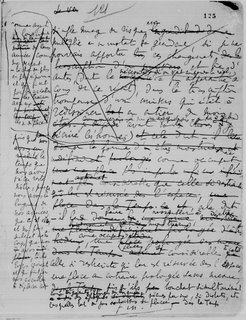 I finished reading In Search of Lost Time last night, five months and two days after I started. The final volume, titled Finding Time Again in the Penguin translation, took me only six days, during which I began to have the awful thought that if "anything" were to "happen to me" (that odd euphemism), it could happen before I had finished reading Proust. I had to keep reading! How strange then to find that as In Search of Lost Time nears its end, the work's still-unnamed narrator, after finally coming to understand his vocation as a writer, fears that something might happen to him before he is able to finish his work.
I finished reading In Search of Lost Time last night, five months and two days after I started. The final volume, titled Finding Time Again in the Penguin translation, took me only six days, during which I began to have the awful thought that if "anything" were to "happen to me" (that odd euphemism), it could happen before I had finished reading Proust. I had to keep reading! How strange then to find that as In Search of Lost Time nears its end, the work's still-unnamed narrator, after finally coming to understand his vocation as a writer, fears that something might happen to him before he is able to finish his work.
Proust really seems in such ways to be a kindred spirit. He seems to have understood in so many ways what it is that "we" (recurring word in the novel) experience in our relations to people, places, and things in time. He is, for me, the writer of consciousness and memory. His explorations of both, alas, make the stream of consciousness of Ulysses -- e.g., "Sardines. Little things. Good with toast." -- seem a bit like a dated gadget. (That's a made-up sample of Joyce. But if I'm reading correctly, some of the comments in Finding Time Again on the representation of consciousness in fiction appear to be aimed at Joyce's work-then-in-progress.)
I finished reading Proust for the first time: that's what I should've written above. I plan to go back, soon. Before I do, I want to read Pleasures and Days (sketches and short stories), a volume of letters, Céleste Albaret's memoir Monsieur Proust (CA was Proust's housekeeper), Edmund White's short bio, and Howard Moss' The Magic Lantern of Marcel Proust (a used-book find). And I plan to dip, at least, into the large biographies, Gilles Deleuze's Proust and Signs, and, of course, the French text and the earlier translations. And I'm wondering whether I want to read Alain de Botton's How Proust Can Change Your Life. He already has.
Here's one passage from Finding Time Again, in which the narrator is contemplating what a book might be. I've corrected one typo in the Penguin paperback:
How much better life seemed to me now that it seemed susceptible of being illuminated, taken out of the shadows, restored from our ceaseless falsification of it to the truth of what it was, in short, realized in a book! How happy the writer of a book like that would be, I thought, what a labour awaited him! To give some idea of it, one would have to go to the most elevated and divergent arts for comparisons; for this writer, who would also need to show the contrasting aspects of each character to create depth, would have to prepare his book scrupulously, perpetually regrouping his forces as in an offensive, and putting up with the work like tiredness, accepting it like a rule, constructing it like a church, following it like a regime, overcoming it like an obstacle, winning it like a friendship, feeding it up like a child, creating it like a world, without ever neglecting its mysteries, the explanations for which are probably to be found only in other worlds, while our occasional inklings of them are what, in life and in art, move us most deeply. In books of this scope, there are parts which have never had time to be more than sketched in and which will probably never be finished because of the very extent of the architect's plan. Think how many great cathedrals have been left unfinished! One feeds a book like that, one strengthens its weak parts, one looks after it, but eventually it grows up, it marks our tomb, and protects it from rumours and, for a time, from oblivion. But to return to myself, I was thinking about my book in more modest terms, and it would even be a mistake to say that I was thinking of those who would read it as my readers. For they were not, as I saw it, my readers, so much as readers of their own selves, my book being merely one of those magnifying glasses of the sort the optician at Combray used to offer his customers; my book, but a book thanks to which I would be providing them with the means of reading within themselves. With the result that I would not ask them to praise me or to denigrate me, only to tell me if it was right, if the words they were reading in themselves were really the ones I had written (possible divergences in this regard not necessarily always originating, it should be said, in my having been wrong, but sometimes in the fact that the reader's eyes might not be of a type for which my book was suitable as an aid for self-reading).
Marcel Proust,
Finding Time Again, translated by Ian Patterson (London: Penguin, 2003), 342-343
[Pictured, the last manuscript page of
À la recherche du temps perdu, via
Gallica Proust.]
Proust posts, via Pinboard




